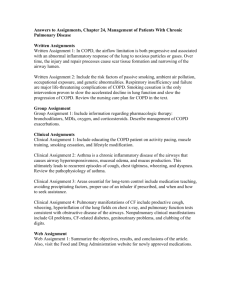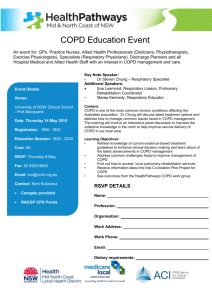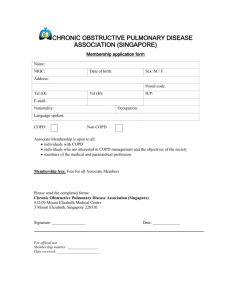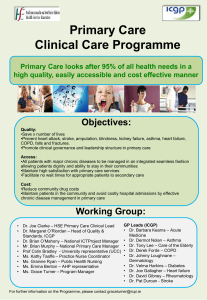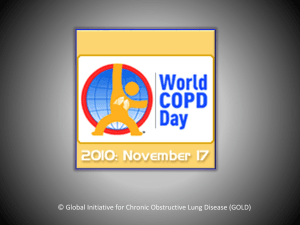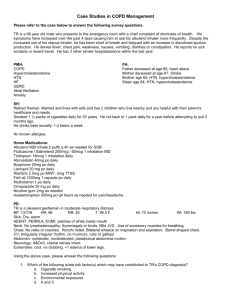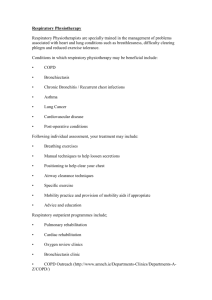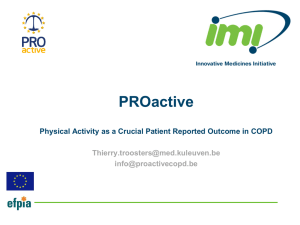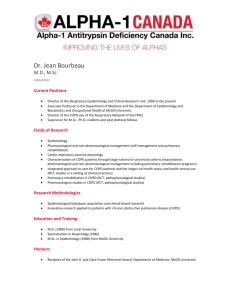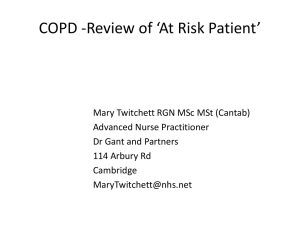COPD8 - COPD Conferences
advertisement
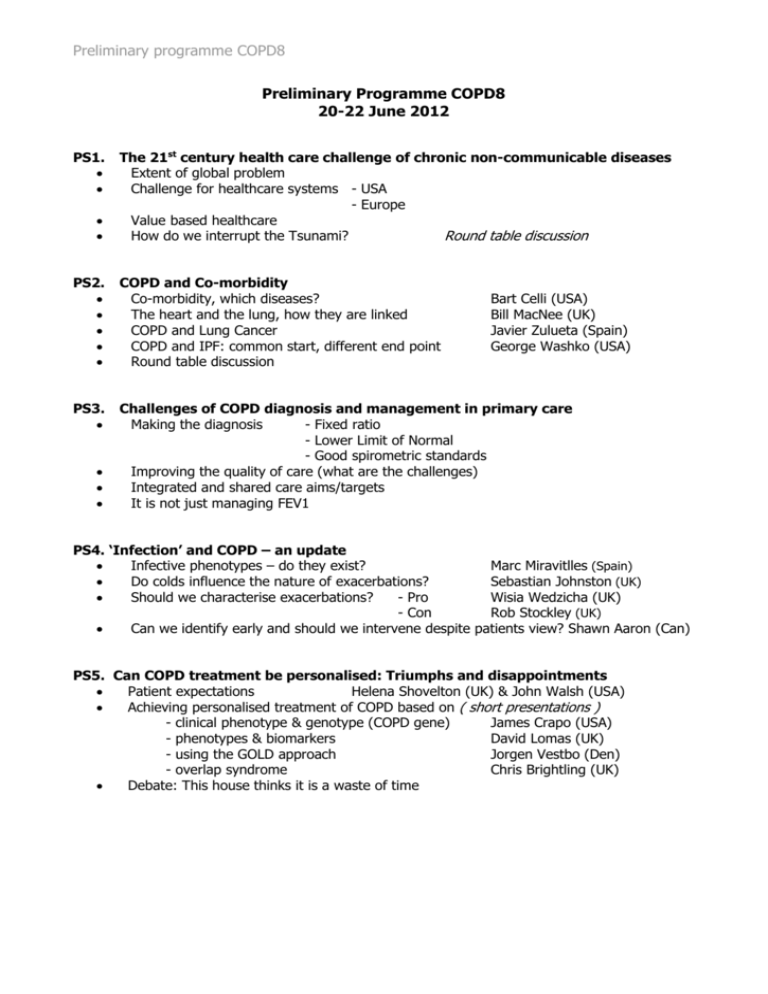
Preliminary programme COPD8 Preliminary Programme COPD8 20-22 June 2012 PS1. The 21st century health care challenge of chronic non-communicable diseases Extent of global problem Challenge for healthcare systems - USA - Europe Value based healthcare How do we interrupt the Tsunami? Round table discussion PS2. COPD and Co-morbidity Co-morbidity, which diseases? The heart and the lung, how they are linked COPD and Lung Cancer COPD and IPF: common start, different end point Round table discussion PS3. Challenges of COPD diagnosis and management in primary care Making the diagnosis - Fixed ratio - Lower Limit of Normal - Good spirometric standards Improving the quality of care (what are the challenges) Integrated and shared care aims/targets It is not just managing FEV1 Bart Celli (USA) Bill MacNee (UK) Javier Zulueta (Spain) George Washko (USA) PS4. ‘Infection’ and COPD – an update Infective phenotypes – do they exist? Marc Miravitlles (Spain) Do colds influence the nature of exacerbations? Sebastian Johnston (UK) Should we characterise exacerbations? - Pro Wisia Wedzicha (UK) - Con Rob Stockley (UK) Can we identify early and should we intervene despite patients view? Shawn Aaron (Can) PS5. Can COPD treatment be personalised: Triumphs and disappointments Patient expectations Helena Shovelton (UK) & John Walsh (USA) Achieving personalised treatment of COPD based on ( short presentations ) - clinical phenotype & genotype (COPD gene) James Crapo (USA) - phenotypes & biomarkers David Lomas (UK) - using the GOLD approach Jorgen Vestbo (Den) - overlap syndrome Chris Brightling (UK) Debate: This house thinks it is a waste of time Preliminary programme COPD8 Basic Science Mini Symposia BS1. Neutrophil Migration This session reconsiders the potential role of the neutrophil in the pathophysiology of COPD exploring recent knowledge of cell function Chair: Edwin Chilvers & Liz Sapey Introduction: The traditional role of the neutrophil Neutrophil transit Neutrophil migration Neutrophil NETs Neutrophil and tissue damage Panel discussion Rob Stockley (UK) Edwin Chilvers (UK) tbc tbc Alison Condliffe (UK) BS2. The COPD Scientific year in perspective (1) Technological advances has led to information overload in the study of ‘omics’. This session provides a realistic update of these advances Chair: Professor Gary Anderson & Professor David Lomas Introduction: How do we handle information overload Microbiome Fernando Martinez (USA) Proteomics tbc Biomarkers Bart Celli (USA) Immunology Guy Brusselle (Bel) Panel discussion Gary Anderson (Aus) BS3. COPD models This session describes new models being used to explore the pathophysiology of COPD Chair: Moira Whyte (UK) Introduction: What contributes an ideal model / models Skin models Ian Sabroe (UK) Endotoxin challenge Dave Singh (UK) Explanted lung Paul Corris (UK) Bio-artificial lung Matthew Hind (UK) Zebra fish Steve Renshaw (UK) Panel discussion BS4. The COPD Scientific year in perspective (2) Moira Whyte (UK) This provides an update on the understanding of mechanistic processes that direct current and future therapies Chair: tbc Introduction Alpha-1 Ageing Imaging Stem cells Panel discussion Rob Stockley (UK) Gerry McElvaney (Ire) Bill MacNee (UK) David Parr (UK) David Lomas (UK) Preliminary programme COPD8 Clinical Science Mini Symposia CS1. Vitamins and COPD This session introduces the increasing evidence to implicate vitamins in the pathophysiology of COPD Chair: Marc Decramer Introduction: Why would vitamins be considered to be important Rationale for use of Vitamin D in Chronic Disease Vitamin D Deficiency in animal models Vitamin D Status in COPD and effects of supplementation Panel discussion M Decramer (Bel) Alice Wood (UK) GR Zosky (Australia) Wim Janssens (Bel) CS2. Nature or nurture This session will review the evidence that COPD is predetermined making the smoker susceptible Chair: tbc Introduction: Why would COPD run in families Early life influences Is there a genetic predisposition that makes sense? Lung development and population studies Panel discussion CS3. The roll of fat in COPD This session explains how body habitas not only affects management but also influences the pathophysiology of COPD Chair: Emil Wouters (NL) Metabolic phenotype and adipose tissue inflammation in COPD tbc Influence on inflammation (20 min) Guy Brusselle (Bel) Influence on mechanics/physiology (20 min) Denis O’Donnell (Can) Implications for the management of COPD (20 min) Emil Wouters (NL) Panel discussion CS4. Exacerbations This session updates our knowledge of COPD exacerbations exploring the changes in incidence and the understanding of the clinical effects and course Chair: Wisia Wedzicha & John Hurst Introduction: Are exacerbations as important as they were? (10 min) John Hurst (UK) Epidemiology (20 min) David Mannino (USA) Are COPD exacerbations similar to asthma exacerbations (20 min) Ian Pavord (UK) Physiology changes (20 min) Gavin Donaldson Mechanisms of recovery (20 min) Wisia Wedzicha (UK) Panel discussion Preliminary programme COPD8 Care Delivery Mini Symposia CD1. Improving the management of the disease This session will explore different aspects of supporting patients and clinicians to manage the disease better Chair: tbc Introduction Self management and supported self management End of life care – can we do it better Decision support aids – can they help the busy clinician? Telehealth and monitoring – when is it useful and cost effective? CD2. Rehabilitation and reablement This session will provide an update on new developments in pulmonary rehabilitation and in other aspects of the psychosocial care of patients Chair: Tim Griffiths Memorial Lecture Sally Singh Neurocognitive aspects – how do we include them? Pulmonary rehabilitation after exacerbations – is there a clear case? Reablement – what else is required? CD3. Getting some of the basics right This session will revisit some of the important interventions in preventing COPD and managing the disease and its symptoms in the later stages Chair: tbc Smoking cessation making it happen Oxygen assessments and review Crisis breathlessness Domiciliary NIV: When is it needed? CD4. Achieving Quality outcomes in COPD This session will describe key elements of a holistic approach to improving outcomes for people living and working with COPD Chair: tbc Introduction – ‘The outcomes based approach in England’ Effective preventative approaches Understanding variation in care to deliver improvement COPD and the impact on work: How can we keep people actively employed Measuring patient experience
